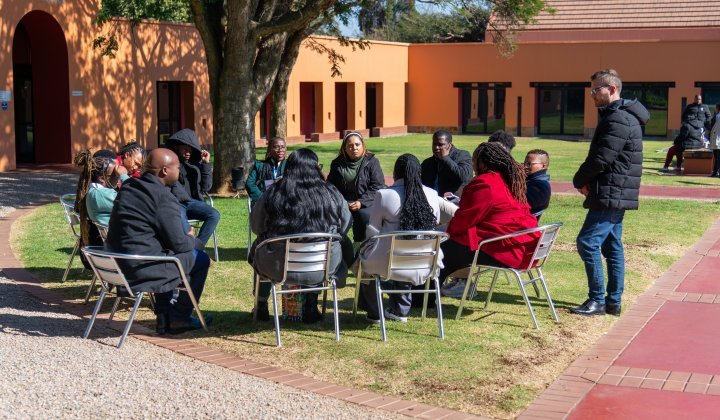Cameras trained on her and peppered with questions, Suzanne Daniels appeared several times before the Zondo Commission into state capture in 2020 and 2021. Throughout her testimony, the former Eskom company secretary and legal head offered insights into her thinking and the toll whistleblowing had taken on her personally and professionally. She expressed fear of retaliation, disclosed how “many of the implicated board members were extremely irate”, and how one board member said, ‘If these people think I am going down alone, they have another thing coming. Everybody knows this board is a Gupta board’.”
During a GIBS Speaking Truth to Power discussion, Daniels elaborated on her experience. She shared a virtual stage with Claudelle von Eck, former CEO of the Institute of Internal Auditors SA, and Cynthia Stimpel, who tipped off Treasury about the SAA-BNP Capital deal. “I had physical threats directed at me and my daughter,” Daniels recounted. “I suffered retaliation at ministerial level, at colleague level, quite visibly in the media, even before I went to Parliament. I was also harassed at work.”
She explained, “It took me a long time to reconcile what I was seeing and how I was going to act on it.”
The act of whistleblowing, the lead up to the decision and the response from those in power, is the subject of a new GIBS whitepaper entitled Whistleblower voices: accounts from and about South African whistleblowing.
A robust interrogation
Building on the 2019 Ethics Barometer, which highlighted a fear of victimisation as the primary reason (43%) why employees do not report misconduct, the GIBS Centre for Business Ethics joined forces with the Responsible and Sustainable Business Lab at Nottingham Business School in the UK to explore the act of whistleblowing.
Some 27 people, who were either prominent whistleblowers or who had worked with whistleblowers, were interviewed, explains Gideon Pogrund, director of the Centre for Business Ethics. Of the 27, 14 individuals were whistleblowers, nine had worked in roles that required the interviewees to engage with whistleblowers, and four straddled the two groups.
Nicola Kleyn, dean of executive education at Erasmus University’s Rotterdam School of Management and extraordinary professor at GIBS, came on board as lead author for this piece of the project.
Why blow the whistle?
Anyone who reports acts “they see as illegal, immoral or illegitimate” can be deemed a whistleblower. These individuals are not only former or current employees, but they also come from the ranks of suppliers, competitors, customers, union officials and members of the public.
Understanding the motivations of such a wide group can be complex and spans the promotion of ethical behaviour, self-protection and even personal exoneration. In some instances, the decision could even be fuelled by feelings that include “disgruntlement, greed, jealousy, malice and revenge”.
Irrespective of the reasons, the decision-making process that leads up to a formal act of whistleblowing is invariably fraught – as was alluded to by Daniels and the other whistleblowers interviewed. As one recounted, “I picked up the phone a few times, and then I put it down because, I don’t know, what do you say?”.
How is the whistle being blown?
The whitepaper indicated that the decision to report wrongdoing was not taken lightly. “All of the whistleblowers interviewed made their decisions to alert others to their concerns after much deliberation,” wrote the authors. “For many respondents, whistleblowing occurred after extensive efforts to surface, question and discuss their concerns.”
Of the 14 whistleblowers interviewed, only one chose to resign and later report the company. The rest raised their concerns within the organisation before choosing to formally report the unethical or illegal conduct. Three respondents informally approached colleagues, line managers and the CEO to have an ‘I’m not comfortable with this’ conversation. Four raised issues with their line managers, two went directly to the CEO, one to the chief operating officer, and one to the chief financial officer. One approached internal compliance. Four of the whitepaper respondents chose to raise initial concerns with external parties, including regulators, professional bodies, and unions.
Blowing the whistle
What is notable is that when the time came to formally ‘blow the whistle’, none of the whistleblowing interviewees did so by reporting their concerns internally; each looked for an external option.
As the whitepaper notes, “The vast majority of interviewees elected to blow the whistle on perceived misconduct to a wide variety of external organisations, both public and non-governmental. These included the JSE, National Treasury, the Public Protector, Corruption Watch, OUTA, the Competition Commission, the Ethics Institute, WhistleBlowers International and the South African Bureau of Standards.”
Certainly, by the time this decision was taken, many internal avenues may have appeared closed or ineffective. As one interviewee commented, “You have whistleblowing because there has been a failure of good performance management, a failure of good internal controls, a failure of good risk management, a failure of good, transparent communication, and so the whistleblower is at the end of a series of failures.”
This indicates that the initial exploration phase, during which internal leaders and colleagues are approached, resulted in a dead-end. Similarly, nothing happened at stage two when concerns were raised either internally or externally. Thus, the only option left was to blow the whistle or do nothing.
This glimpse into the broader whistleblower ecosystem reinforces the fact that the act of exposing wrongdoings is far wider than just the relationship between the whistleblower and the recipient of the communication. “The actors involved before, during and after whistleblowing are extensive and varied,” explains the whitepaper. They span corporate boards and auditing firms, external parties and internal players.
How this system operates to support whistleblowers is particularly important in the context of a South Africa bedevilled by what one interviewee called ‘systemic corruption’ and a lack of trust. This whistleblower added, “How can you trust a structure where the protection is a matter of life and death? Unless there is absolute confidence in the people that are running it?”
While not all respondents shared this view, it clearly highlights the need to nurture a strong civil society and external bodies that provide avenues through which to report misconduct. There is also a need to focus more intently and critically on the composition of boards and the issue of dissent, rather than opting for ‘cosy’ boards that create echo chambers that are not conducive to exercising fiduciary care, says Kleyn.
Similarly, HR functions should also be interrogated. “I was horrified in these interviews just around how HR became complicit in the persecution of whistleblowers; the disciplinaries that were issued,” says Kleyn. “This raises serious questions about the HR profession. Their role is sometimes the last vanguard within the company that will safeguard ethical conduct.”
What can companies do?
In line with these observations, the whitepaper outlined how companies can, and should, find ways to encourage whistleblowers to come forward and actively address their concerns. The authors detailed four themes associated with the organisational management of whistleblowing:
- Embedding knowledge management – both at the level of understanding regulations and policy as they pertain to the rights of whistleblowers and the need for training, education and awareness.
- Implementing effective whistleblowing processes – including procedures and processes covering reporting options, how management deals with tip-offs and offers feedback, and which are designed to build trust and ensure confidentiality.
- Exercising duties of care – specifically concerning the members of the board of directors and HR experts.
- Fostering a speak-out culture – linked to organisational cultures that welcome inquiry and disagreement, and regard this as part of a healthy and ongoing internal dialogue.
Impressions and reflections
As part of a much bigger project exploring the whistleblowing ecosystem, this whitepaper not only provides academic and practitioner-orientated value but enables South Africa to share relevant and important insights with the rest of the world, believes Pogrund. However, warns Kleyn, while the whistleblowers interviewed had undoubtedly worked at ethically dysfunctional organisations that were not even trying to be ethical, South African organisations should not all be tarred by the same brush.
“I would hate to create the impression that this is common practice in South African organisations because I think it’s not,” she said. “These events happen in a particular type of organisation.”
The antidote to changing those organisations, believes Pogrund, is dissent. “I often quote Michael Katz [chairman of ENSafrica], who talks about the need for a culture of dissent as being the most effective bulwark against ethical failure. And I think whistleblowing has a lot to do with that,” he explains. “When people are silent, and where people are silenced, the consequences are very dangerous. So, with this whitepaper, we wanted to raise awareness in the country about whistleblowing. Many of these people suffer terribly; they’re treated as pariahs. They are isolated and ostracised.”
And some pay with their lives.
Fallen heroes
In August 2021, Babita Deokaran, a witness in the Gauteng Department of Health’s ongoing personal protective equipment health scandal, was assassinated. Her death highlights the threat facing those who stand up to corruption and unethical practices. And she is not alone.
Two politicians, Jimmy Mohlala and James Nkambule, were killed following their respective allegations of graft associated with the R1.2 billion Mbombela stadium tender ahead of the 2010 Soccer World Cup. And there are other names to remember: Sindiso Magaqa, Thabiso Zulu, Xola Banisi and Moss Phakwe, among others.
Recommendations
The whitepaper included recommendations which organisations – be they public or private – should implement to encourage and manage whistleblowing.
- Actively build an ethical culture that welcomes whistleblowing.
- Actively involve non-executive board members.
- Widely communicate policies and the organisation’s support for whistleblowers, and back this up with regular training.
- Create structures that make it easy and safe to blow the whistle.
- Sensitise managers and HR employees to recognise and flag signs of whistleblower abuse.
- Manage investigations according to defined timelines and reporting points.
- Act against unethical conduct, and report back on criminal or civil convictions.
- Develop an organisational protocol for reporting back on the process and outcomes of whistleblowing.
- Support NGOs that work with and support whistleblowers.
- Give whistleblowers a voice to tell their stories and encourage reflection.




